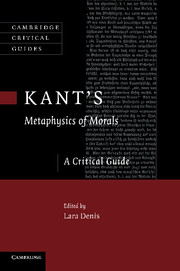Book contents
- Frontmatter
- Contents
- Notes on contributors
- Acknowledgements
- List of translations and abbreviations
- Introduction
- 1 Kant's Metaphysics of Morals: the history and significance of its deferral
- 2 Reason, desire, and the will
- 3 Justice without virtue
- 4 Kant's innate right as a rational criterion for human rights
- 5 Intelligible possession of objects of choice
- 6 Punishment, retribution, and the coercive enforcement of right
- 7 Moral feelings in the Metaphysics of Morals
- 8 What is the enemy of virtue?
- 9 Freedom, primacy, and perfect duties to oneself
- 10 Duties to and regarding others
- 11 Duties regarding animals
- 12 Kant's Tugendlehre as normative ethics
- Bibliography
- Index
8 - What is the enemy of virtue?
Published online by Cambridge University Press: 10 January 2011
- Frontmatter
- Contents
- Notes on contributors
- Acknowledgements
- List of translations and abbreviations
- Introduction
- 1 Kant's Metaphysics of Morals: the history and significance of its deferral
- 2 Reason, desire, and the will
- 3 Justice without virtue
- 4 Kant's innate right as a rational criterion for human rights
- 5 Intelligible possession of objects of choice
- 6 Punishment, retribution, and the coercive enforcement of right
- 7 Moral feelings in the Metaphysics of Morals
- 8 What is the enemy of virtue?
- 9 Freedom, primacy, and perfect duties to oneself
- 10 Duties to and regarding others
- 11 Duties regarding animals
- 12 Kant's Tugendlehre as normative ethics
- Bibliography
- Index
Summary
INTRODUCTION
What is the enemy of virtue? What is it that explains the empirically undeniable fact that, for human beings, becoming virtuous is a struggle, something accomplished in the face of some opposing force?
Answering this question is crucial for understanding what virtue itself is: if we do not understand what virtue has overcome, we don't really understand the state that results from the struggle. Yet Immanuel Kant is notoriously contradictory, or at best ambiguous, in his answer to this question. In the Doctrine of Virtue, the apparently unambiguous enemy of virtue is the inclinations, understood as a natural force. But in Religion within the Boundaries of Mere Reason, Kant suggests that inclinations “bear no direct relation to evil” (RGV 6:35), and thus cannot be opposed to virtue. Instead, we must look to our free capacity to reason and choose as somehow being the internal, conflicted source of opposition. There is, thus, a major conflict in Kant's moral works. Having just (in 1793) identified our freely chosen propensity to evil as the enemy of virtue, he turns around four years later and claims that virtue involves the constraint not of freedom but of our unruly sensible natures. Which account should we prefer, and why?
In this chapter, I investigate this question. First, I compare the two scenarios: inclinations, then a particular state of a free, rational being, as the enemy of virtue.
Keywords
- Type
- Chapter
- Information
- Kant's Metaphysics of MoralsA Critical Guide, pp. 152 - 169Publisher: Cambridge University PressPrint publication year: 2010
- 47
- Cited by

